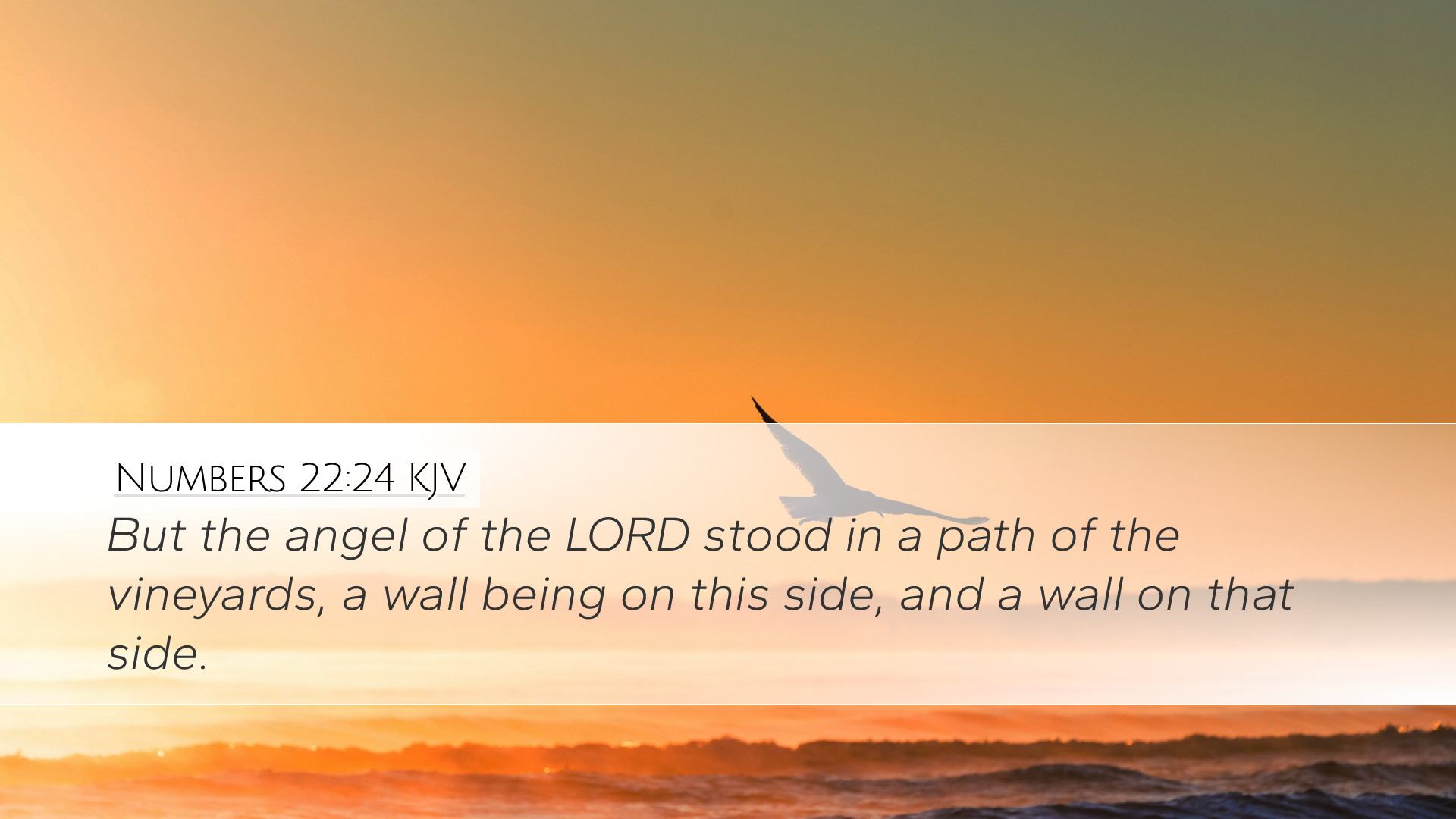Commentary on Numbers 22:24
The verse Numbers 22:24 reads: "But the angel of the LORD stood in a path of the vineyards, a wall being on this side, and a wall on that side." This passage is pivotal within the larger narrative concerning Balaam, a character who embodies the tension between divine will and human agency. Below is a synthesis of insights drawn from the public domain commentaries of Matthew Henry, Albert Barnes, and Adam Clarke.
Contextual Background
To fully grasp the significance of Numbers 22:24, one must consider the surrounding narrative. Balaam, a prophet for hire, is summoned by Balak, the King of Moab, to curse the Israelites. Despite initial hesitations and divine warnings, Balaam sets forth on his journey accompanied by his influential intentions. This context is crucial to understanding the divine intervention presented in this verse.
The Angel of the LORD
The presence of the angel of the Lord in this verse serves as a divine messenger, symbolizing God’s authority over the affairs of men. This angel is not merely a supernatural figure but represents divine intervention aimed at redirecting Balaam’s path. Albert Barnes highlights that this incident signifies God's opposition to Balaam’s intent to curse Israel, underscoring the idea that divine plans cannot be thwarted by human desires.
Symbolic Significance
The walls described, which flank the path of the vineyards, suggest limitations in Balaam's journey. Adam Clarke interprets these physical barriers as metaphorical representations of the constraints imposed by God’s sovereignty. The narrow path indicates that Balaam’s choices are ultimately confined by God’s will, regardless of his intentions. This metaphor invites reflection on the broader theme of God's omniscience and omnipotence in guiding the lives of individuals.
Divine Intervention
Balaam’s inability to see the angel, despite being a seer, illustrates a profound spiritual blindness. Matthew Henry expounds on this by stating that Balaam's spiritual condition—his heart being divided between God’s will and his own desires—led to a moment of profound ignorance. As believers, this emphasizes the importance of discernment and aligning one’s intentions with divine purpose.
The Nature of the Spiritual Conflict
This passage serves as a reminder of the spiritual conflict inherent in human choices. The angels, representing the will of God, directly oppose Balaam’s way. Albert Barnes notes that similar dynamics occur in the lives of many; where one may face divine restrictions as they pursue personal ambitions contrary to God’s commands. The lesson here is one of caution: the pursuit of self-interest can often lead one astray from the divine path ordained by God.
Lessons for Contemporary Believers
As we contemplate Numbers 22:24 in our contemporary setting, several lessons emerge:
- Awareness of Divine Guidance: Just as Balaam was confronted by the angel, we must remain sensitive to the guidance of the Holy Spirit in our lives.
- The Dangers of Compromise: Balaam's desire to blend God’s call with personal ambition serves as a warning against compromises that can lead us away from true obedience.
- God's Sovereignty: This passage affirms that God will intervene in our lives to ensure His will is accomplished, regardless of human plans.
Conclusion
Numbers 22:24 transcends its narrative context to provide timeless truths pertinent to both personal and communal faith practices. The angel’s obstruction signals that the path of disobedience will never align with divine revelation. Matthew Henry encourages us to reflect on our own hearts as we navigate life’s paths: are we open to divine correction? Are we aligning our intentions with God’s will? In conclusion, this verse invites earnest contemplation of our spiritual vision, urging us to seek clarity through prayer, scripture, and the promptings of the Holy Spirit. Only through such diligent seeking can we walk the path prepared for us, unencumbered by the walls of our ambitions and blinded by our desires.


